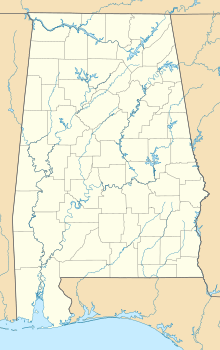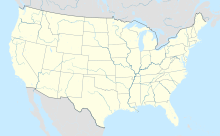Fort Bainbridge facts for kids
Quick facts for kids Fort Bainbridge |
|
|---|---|
| Boromville, Alabama in United States | |
| Coordinates | 32°19′08″N 85°26′06″W / 32.31889°N 85.43500°W |
| Type | Earthen fort |
| Site information | |
| Owner | Private |
| Controlled by | Private |
| Open to the public |
No |
| Site history | |
| Built | 1813-1814 |
| Built by | Georgia militia |
| In use | 1813-1814 |
| Battles/wars | Creek War |
Fort Bainbridge was an old fort made of earth, built a long time ago. It was located along an important path called the Federal Road. Today, you would find its spot near the border of Macon and Russell counties in Alabama.
Contents
Discovering Fort Bainbridge
Fort Bainbridge was a temporary fort built during a time of conflict. It played a small but important role in protecting travelers and supplies. Even though it's not standing today, its history tells us about early Alabama.
Built for Protection: The Creek War Era
Fort Bainbridge was likely named after a brave naval captain named William Bainbridge. It was built either in late 1813 or early 1814. Soldiers from Georgia, led by Colonel Homer V. Milton or General John Floyd, constructed it.
The main reason for building the fort was to keep a supply route safe. This route connected Fort Hull to Fort Mitchell. It was very important during the Creek War, a conflict involving Native American groups and American forces. General Floyd even left his supplies at Fort Bainbridge before a big fight called the Battle of Calebee Creek.
The fort was designed like a bastion fort. This means it had eight parts that stuck out. These parts allowed soldiers to defend the fort from different angles.
Life After the War: A Busy Stop
After the war, Fort Bainbridge was no longer needed as a military base. However, the area around it remained active. A man named Captain Kendall Lewis, along with his father-in-law, Big Warrior, who was a Creek chief, opened a tavern. This tavern was a popular stop for stagecoaches. It was located about 400 yards west of the old fort.
Even after Captain Lewis passed away, his widow kept the tavern running until at least 1836. Many important people passed through this area. For example, the Marquis de Lafayette, a French hero who helped America in the Revolutionary War, stayed at the Lewis Tavern during his visit to Alabama.
The fort's location was also part of the journey of a famous naturalist named William Bartram. He traveled through the Southern United States for four years. During his trip, he wrote about the plants, animals, and Native American cultures he saw. Later, the fort site was used as a large farm, known as a plantation.
Fort Bainbridge Today
Today, Fort Bainbridge is not marked with any signs or monuments. Its history lives on mainly through a small community nearby called Boromville, which grew from the fort's location. Sadly, because the exact spot is known, some people have damaged the area while looking for old artifacts.
Images for kids
 | DeHart Hubbard |
 | Wilma Rudolph |
 | Jesse Owens |
 | Jackie Joyner-Kersee |
 | Major Taylor |




